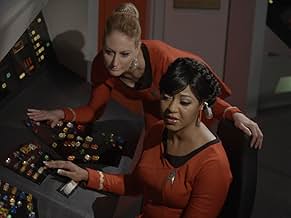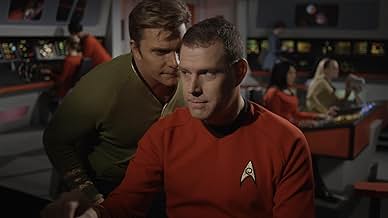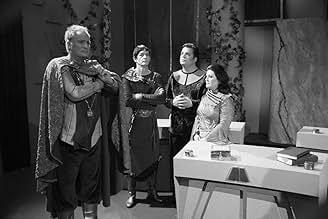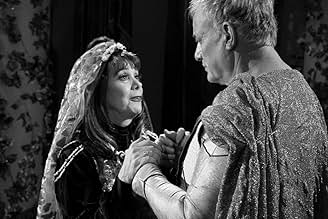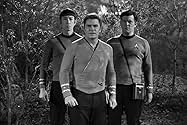What Ships Are For
- Episode aired Jul 30, 2017
- 49m
IMDb RATING
8.5/10
346
YOUR RATING
Kirk struggles with aiding a society whose inhabitants view their isolated world in a very unique way.Kirk struggles with aiding a society whose inhabitants view their isolated world in a very unique way.Kirk struggles with aiding a society whose inhabitants view their isolated world in a very unique way.
- Awards
- 1 win total
Christopher Doohan
- Mr. Scott
- (as Chris Doohan)
Featured reviews
Kirk and crew go to a very black and white world.
I have seen all eleven episodes of Continues. This is the best episode. There is no playing around with classic episodes such as Mirror Mirror or City On The Edge Of Forever - this is new and fresh!
The acting is of a greater standard than previous episodes due to the quality guest stars but more importantly - this is just a great science fiction drama!
Forget Netflix Star Trek, forget Star Trek Lower Decks, forget those CGI filled movies of recent times - What Ships Are For is what Star Trek is really all about.
To reveal plot points would be a crime, to miss it would be an even bigger crime - outstanding!
I have seen all eleven episodes of Continues. This is the best episode. There is no playing around with classic episodes such as Mirror Mirror or City On The Edge Of Forever - this is new and fresh!
The acting is of a greater standard than previous episodes due to the quality guest stars but more importantly - this is just a great science fiction drama!
Forget Netflix Star Trek, forget Star Trek Lower Decks, forget those CGI filled movies of recent times - What Ships Are For is what Star Trek is really all about.
To reveal plot points would be a crime, to miss it would be an even bigger crime - outstanding!
Amazing true to the times episode. Star Trek continues to attack societal issues head on. Amazing how the one star reviewers don't recognize what Star Trek is all about. How long has it been since you watched "Let that be your last Battlefield"? One star reviewers don't want to look in the mirror because these episodes hit so close to home. Star Trek is and always has been about acceptance, inclusivity, and social justice. There are very few episodes that stand alone and don't address these issues blatantly. How can one not see that? If you can't see that, rewatch TOS one episode at a time and you'll see the color for the first time- not unlike the population in this episode.
I thought this episode was excellent, and lived up to the spirit of the original series. They have done an excellent job with sets and costumes. I enjoyed Kirk's persuasive speech near the end of the Episode. It was enjoyable to see the actor John de Lancie, who played "Q" i The Next Generation, on the set. Anne Lockhart is also in the show, one of my favorite actresses.
10flgrovez
The original Star Trek always took modern issues and made parable stories that reflected that and gave a more compassionate view. This is what this episode does very well. I saw one review that got very angry and explained in detail of how he and his conservative friends don't need lecturing and aren't bigots, but if this were true, the episode would not have caused this level of anger. I believe the episode does what it was intended to do. Make people think. Like the best of the original Star Trek episodes where we encounter racism, religious bigotry, sexism, this deals with our compassion as human beings. And it says it beautifully.
When the usual three beam down on a world they notice something weird...it's all monochromatic! It seems that some sort of radiation in this world causes the eyes to not be able to see color! Additionally, something about this radiation also is killing the people off slowly. Can the Enterprise get to the root of the problem and solve it? And, what unusual discovery do they make about 20% of the people of this world?
The folks making this series had a few casting coups. Some well-known actors such as Erin Gray ("Buck Rogers") were guest stars...and in this one, John de Lancie ('Q' from "Star Trek: the Next Generation" and other Trek shows) and June Lockhart's daughter, Anne ("Battlestar Galactica") guest star.
Like many episodes of the original series, this one deals with contemporary issues...and I'll say no more about it, as I don't want to ruin the suspense. Regardless, it's a very fascinating episode...among the very best of the new shows. Very well written and it does make you think.
The folks making this series had a few casting coups. Some well-known actors such as Erin Gray ("Buck Rogers") were guest stars...and in this one, John de Lancie ('Q' from "Star Trek: the Next Generation" and other Trek shows) and June Lockhart's daughter, Anne ("Battlestar Galactica") guest star.
Like many episodes of the original series, this one deals with contemporary issues...and I'll say no more about it, as I don't want to ruin the suspense. Regardless, it's a very fascinating episode...among the very best of the new shows. Very well written and it does make you think.
Did you know
- TriviaThis episode features a guest appearance by John De Lancie, the actor who previously played Q on multiple Star Trek spinoff series.
- Quotes
Galisti: Hundreds of years ago, the people of Hyalinus united under a single purpose: to one day become worthy of joining the community of stars.
Thaius: To us, this meant seeking out the best in ourselves and each other. Laying down arms against one another... erasing our borders... and refusing to define ourselves using distinctions like 'us' and 'them.'
Details
Contribute to this page
Suggest an edit or add missing content

